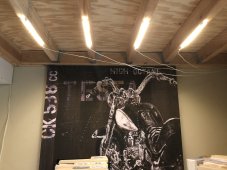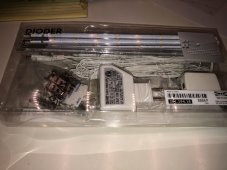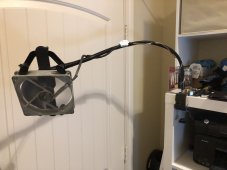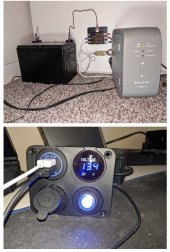The RV association adopting the NEC wiring standards isn't the same as legal enforcement.https://www.rvia.org/node/association-and-ansi-adopted-standards
The following standards have been adopted by the RV Industry Association’s Board of Directors for the construction of RVs and Park Model RVs.
- National Electrical Code (NEC) (2023 Edition)
- The NEC is the authoritative document addressing electrical installations in residential, commercial, and industrial settings. The 2023 edition represents a significant revision to modernize the code to reflect the rapidly evolving electrical landscape. Stay up to date as you design, install, and inspect with current requirements for wiring, overcurrent protection, grounding, and equipment.
You are using an out of date browser. It may not display this or other websites correctly.
You should upgrade or use an alternative browser.
You should upgrade or use an alternative browser.
Best residential plug for 12v in house? (vs 120v)
- Thread starter Natty
- Start date
I appreciate your thoughts on this tread. I really doMy experience after being involved in several (hundred) off-grid projects since the 90's is that 12v appliances tend to be overpriced, unreliable (short lives) and have darn right pitiful performance when compared to thier AC counterparts. Certainly a terrible selection and you sure aren't running to town and buying a replacement the day it fails.
So the money you think you're saving on a smaller inverter and less solar wattage is likely more than gobbled up by the higher cost of and required sacrifices of using DC appliances. The reality is that even the smallest off grid places often end up with thier inverters on 24/7 so there's just no escaping an inverter's tare loss. I've converted many off grid houses with 12v appliances and propane fridges to full time 120/240 AC and the occupants are very grateful. Just my 2 cents.
edit to fix typo
And I have had my suspicions that 12v appliances are not great. thank you for the input
My view is more "in case". For example I may want to use some lamps, that have sentimental value, in the 12v. I have also considered converting an old Singer sewing machine to 12v.
It will be a small place that I build. Probably no more that 5 rooms. So I figure might as well put in a 12v outlets, alongside the 120v outlets, because it will be my castle.
As a side note- I will defiantly be putting in emergency lighting that is 12v in all rooms. I salvaged a bunch of 12v fixtures from an RV wrecking yard years ago for this purpose. In my mind, 80% of the benefits of electricity is lighting. I even have some heavy duty 20amp commercial grade switches I will use for the emergency lighting switches (think they are any good?
That is right about the last time I did a deep dive on this. What brought y interest back was Will's Youtube channelThings have changed a lot since Mother Earth News in the 90's.
Switching DC is different and more difficult than AC. The switches will probably work but may degrade unless DC rated. Plenty of 12v DC switches available.I even have some heavy duty 20amp commercial grade switches I will use for the emergency lighting switches (think they are any good?
This is true but a 12V light is unlikely going to cause much of an arc on the contacts when opened.Switching DC is different and more difficult than AC. The switches will probably work but may degrade unless DC rated. Plenty of 12v DC switches available.
The general rule of thumb is that below 30 VDC, an AC rated switch will work fine.Switching DC is different and more difficult than AC. The switches will probably work but may degrade unless DC rated. Plenty of 12v DC switches available.
Quattrohead
Solar Wizard
My opinion would be plenty of 120 volt outlets so that you can use any appliance power adapter, 5 volts, 12 volts or 20 volts etc.
I hear you on the 12 volt emergency lighting but again maybe a separate 120 volt inverter for lighting and with LED bulbs you can use a small capacitor across the switch contacts to have them glow gently 24/7.
I hear you on the 12 volt emergency lighting but again maybe a separate 120 volt inverter for lighting and with LED bulbs you can use a small capacitor across the switch contacts to have them glow gently 24/7.
Let me also recommend Anderson Powerpoles and as shown in post #7 you can have a proper wall outlet.
I have used everything from wirenuts, WAGO’s, XT-30, XT-60, molex etc. in more than 50 years of ham radio DC power management.
Powerpoles have (finally) turned out to be the de facto standard which was a long time coming.
Government EMCOMM facilities are even getting on board which took a long time.
Your cabin, your choice but above are a few reasons for mine.
I have used everything from wirenuts, WAGO’s, XT-30, XT-60, molex etc. in more than 50 years of ham radio DC power management.
Powerpoles have (finally) turned out to be the de facto standard which was a long time coming.
Government EMCOMM facilities are even getting on board which took a long time.
Your cabin, your choice but above are a few reasons for mine.
OzSolar
Whatever you did, that's what you planned.
It's quite fun to be in this stage of planning, I get it! Sounds like you've got a good approach and understanding of what you're in the middle of.I appreciate your thoughts on this tread. I really do
And I have had my suspicions that 12v appliances are not great. thank you for the input
My view is more "in case". For example I may want to use some lamps, that have sentimental value, in the 12v. I have also considered converting an old Singer sewing machine to 12v.
It will be a small place that I build. Probably no more that 5 rooms. So I figure might as well put in a 12v outlets, alongside the 120v outlets, because it will be my castle.
As a side note- I will defiantly be putting in emergency lighting that is 12v in all rooms. I salvaged a bunch of 12v fixtures from an RV wrecking yard years ago for this purpose. In my mind, 80% of the benefits of electricity is lighting. I even have some heavy duty 20amp commercial grade switches I will use for the emergency lighting switches (think they are any good?
I intend to use the above in a similar matter. However, I plan to use red/black for 12V, green/black for 24V and blue/black for 48V as I will have all three voltages available. A feature of PP connectors (at least for the SB 50 xxx series) is that different colors cannot be mated to each other.https://powerwerx.com/anderson-power-powerpole-sb-connectors#?specs=315
Way better than a cigar connector that somehow meets code in an RV. Nothing sacred about J-Boxes.
All the pictured connectors in the OP would seem to imply other than 12vdc is available.
Standard wall plate:
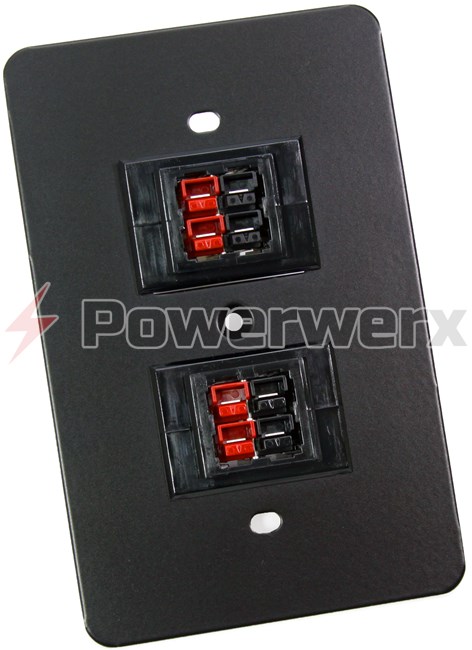
What are you using at those voltages?I intend to use the above in a similar matter. However, I plan to use red/black for 12V, green/black for 24V and blue/black for 48V as I will have all three voltages available. A feature of PP connectors (at least for the SB 50 xxx series) is that different colors cannot be mated to each other.
solar fridge/freezers at 24v, 48v poe injector for starlink dish and other networking equipment, 48v to run monitor equipment, 12v for some battery chargers, etc.What are you using at those voltages?
dougbert
Solar Addict
do you also use different polarizations?I intend to use the above in a similar matter. However, I plan to use red/black for 12V, green/black for 24V and blue/black for 48V as I will have all three voltages available. A feature of PP connectors (at least for the SB 50 xxx series) is that different colors cannot be mated to each other.
Let me also recommend Anderson Powerpoles and as shown in post #7 you can have a proper wall outlet.
I have used everything from wirenuts, WAGO’s, XT-30, XT-60, molex etc. in more than 50 years of ham radio DC power management.
Powerpoles have (finally) turned out to be the de facto standard which was a long time coming.
Government EMCOMM facilities are even getting on board which took a long time.
Your cabin, your choice but above are a few reasons for mine.
I was going to use XT90 but soldering them doesn't look like fun. Powerpoles sure look easier and more versatile.
Last edited:
Frankly, it's the same way in construction. Jurisdictions may adopt different versions of the NEC, not necessarily latest. And they may not inspect electrical at all. It's like that here, our county follows X year NEC, but no inspection is required. Enforcement is triggered by "inspection" - which is usually triggered by permit.The RV association adopting the NEC wiring standards isn't the same as legal enforcement.
An RV with a RIVA sticker should comply with NEC (as indicated above) as it's advertised to that standard. That gives you legal recourse when a product is advertised as meeting a standard and is not built to that standard, various consumer protection laws (citation needed) allow you civil recourse if they don't build them like they advertise them. (I say this knowing full well what the underbelly of a modern RV looks like in terms of AC wiring)
Personally, I'm not using any connector that looks like AC for DC. But that's just me.
Delmar
Solar Addict
As a side note- I will defiantly be putting in emergency lighting that is 12v in all rooms. I salvaged a bunch of 12v fixtures from an RV wrecking yard years ago for this purpose. In my mind, 80% of the benefits of electricity is lighting. I even have some heavy duty 20amp commercial grade switches I will use for the emergency lighting switches (think they are any good?
Great thread. For my next house I also plan to run 12V for everyday lighting and accessory plugs for fans and other low watt stuff. I have already converted most of my office to 12V. Will have a separate backup system for my 48V inverter where I can turnoff 120V power when not required.
IKEA has a good selection of inexpensive and attractive 12V lights. Just look for the wall warts. They have some 24V lights too.
Attachments
FWIW, I am a fan of LVDC for lighting, small electronics, and things that have a habit of needing to move around. For <2A I would pick something like a 4-pin barrel jack; anything larger I would go for the Anderson connectors.
I had seen a faceplate that would accommodate 2 or 4 1/2" round bezel mount connectors plus 2 automotive fuses, but I can't think of where the hell it was... it was likely over 20 years ago.
I had seen a faceplate that would accommodate 2 or 4 1/2" round bezel mount connectors plus 2 automotive fuses, but I can't think of where the hell it was... it was likely over 20 years ago.
kundip
Micro Inverter Enthusiast
For me I would only use 120v AC plugs. (In my case 240V AC in Australia.)While I was here, I thought i would ask the brain trust...
I am looking to wire a cabin/house for 12v appliances/outlets & 120v appliances/outlets
Many moons ago... in the early days of the internet... when I was still in my 20s. Someone suggested to use a different plug for the 12v appliances/outlets so there is much less risk of a mishap. Like plugin in a 12v appliance into a 120v outlet (or vice versa)
I have thought of using different color outlets, but that could still cause a problem when I am old, or people visit
I am not a fan of the cigarette plug style
Anyone have any thoughts on what would be a good type to go with? or ones to avoid?
View attachment 141798
There are so many types 120V AC plug in power packs etc. out there it is unbelievable.
One to suit every need you could think of.
Adding 12v around a cabin/house can only create problems. IMO
It increases the complexity of wiring all over.
12v does not short out cleanly like 120v AC - a lot more chance of starting a fire.
If you need 12v somewhere not near a power point bring the 120v AC there & use a plug pack or the like.
I would not run 12v & 120v AC side by side. Nor cross over it.
Mainly, only you would understand the added system installed.
120v is normal & most people understand it easily.
If selling the cabin later on there may be issues having 12v running around the place especially if you are the only one who understands it.
kundip
Micro Inverter Enthusiast
Sorry. I just read some of the other replies and some them are kind of similar to mine.
My reply was directly off your initial post.
My reply was directly off your initial post.
TorC
Solar Enthusiast
- Joined
- Jan 13, 2022
- Messages
- 514
For a genuinely tiny place, I'd definitely be down for putting in 12V on something like the Anderson connectors, probably a regulated 13.2V for electronics (12V nominal + 10% = 13.2V) if I could find a suitable regulator, rather than battery voltage. Even someone coming in later should be able to easily understand what's going on. Ideally, run the actual wires out of something visibly different so you can tell what is in the wire at a glance.
Similar threads
- Replies
- 15
- Views
- 639
- Replies
- 5
- Views
- 382



